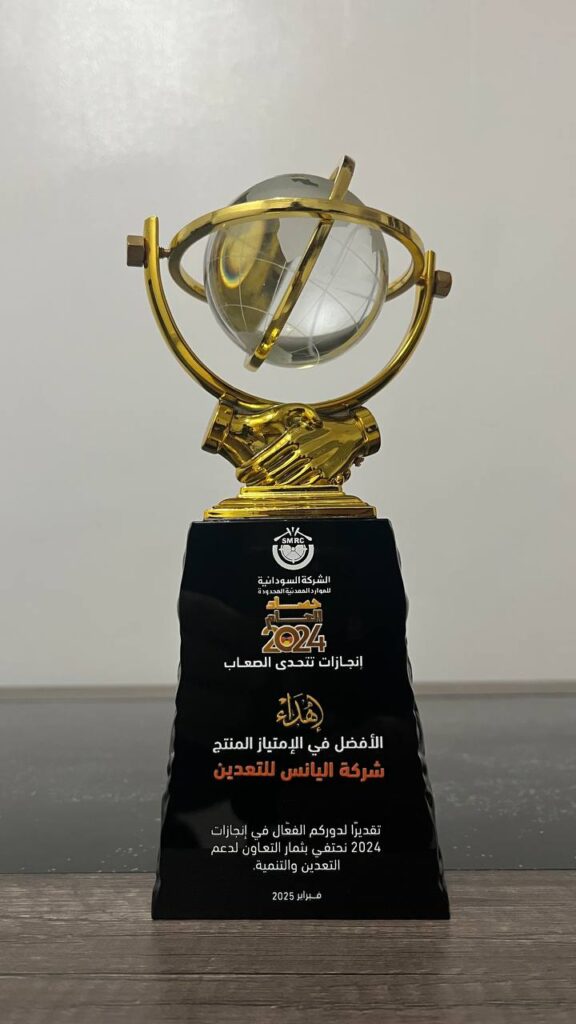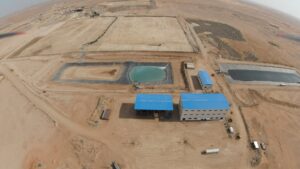- Headquarters
- Exploration Project
- Production Project
Mauritania
Emiral currently has an active exploration project in the Islamic Republic of Mauritania. Since February 2020 local subsidiary EMIRAL Mining SARL has implemented a wide range of prospecting and exploration works to reveal high potential mining targets.
- Al
- Li
- Ni
- Cd
- Cu
- Au
- Ag
- U
Sudan
Emiral’s leading project is the Kush project, implemented in the Republic of the Sudan by Kush for Exploration and Production and its production subsidiary Alliance for Mining. Alliance is the biggest industrial gold producer in Sudan.
- Al
- Li
- Ni
- Cd
- Cu
- Au
- Ag
- U
Mali
Lorem ipsum dolor sit amet, consectetur adipiscing elit, sed do eiusmod tempor incididunt ut labore et dolore magnaLorem ipsum dolor sit amet, consectetur adipiscing elit, sed do eiusmod tempor incididunt ut labore et dolore magna..
- Al
- Li
- Ni
- Cd
- Cu
- Au
- Ag
- U
Niger
Lorem ipsum dolor sit amet, consectetur adipiscing elit, sed do eiusmod tempor incididunt ut labore et dolore magnaLorem ipsum dolor sit amet, consectetur adipiscing elit, sed do eiusmod tempor incididunt ut labore et dolore magna..
- Al
- Li
- Ni
- Cd
- Cu
- Au
- Ag
- U
Chad
Lorem ipsum dolor sit amet, consectetur adipiscing elit, sed do eiusmod tempor incididunt ut labore et dolore magnaLorem ipsum dolor sit amet, consectetur adipiscing elit, sed do eiusmod tempor incididunt ut labore et dolore magna..
- Al
- Li
- Ni
- Cd
- Cu
- Au
- Ag
- U
Burkinia Faso
Lorem ipsum dolor sit amet, consectetur adipiscing elit, sed do eiusmod tempor incididunt ut labore et dolore magnaLorem ipsum dolor sit amet, consectetur adipiscing elit, sed do eiusmod tempor incididunt ut labore et dolore magna..
- Al
- Li
- Ni
- Cd
- Cu
- Au
- Ag
- U
Ivory Coast
Lorem ipsum dolor sit amet, consectetur adipiscing elit, sed do eiusmod tempor incididunt ut labore et dolore magnaLorem ipsum dolor sit amet, consectetur adipiscing elit, sed do eiusmod tempor incididunt ut labore et dolore magna..
- Al
- Li
- Ni
- Cd
- Cu
- Au
- Ag
- U
Ghana
In February of 2021, Emiral formed a local wholly owned subsidiary — Emiral Resources Ghana Ltd. Today, Emiral continuously performs initial exploration on over 170 sq.km divided into 3 prospecting blocks.
- Al
- Li
- Ni
- Cd
- Cu
- Au
- Ag
- U
Ethiopia
Lorem ipsum dolor sit amet, consectetur adipiscing elit, sed do eiusmod tempor incididunt ut labore et dolore magnaLorem ipsum dolor sit amet, consectetur adipiscing elit, sed do eiusmod tempor incididunt ut labore et dolore magna..
- Al
- Li
- Ni
- Cd
- Cu
- Au
- Ag
- U
Eritrea
Lorem ipsum dolor sit amet, consectetur adipiscing elit, sed do eiusmod tempor incididunt ut labore et dolore magnaLorem ipsum dolor sit amet, consectetur adipiscing elit, sed do eiusmod tempor incididunt ut labore et dolore magna..
- Al
- Li
- Ni
- Cd
- Cu
- Au
- Ag
- U
Zimbabwe
Lorem ipsum dolor sit amet, consectetur adipiscing elit, sed do eiusmod tempor incididunt ut labore et dolore magnaLorem ipsum dolor sit amet, consectetur adipiscing elit, sed do eiusmod tempor incididunt ut labore et dolore magna..
- Al
- Li
- Ni
- Cd
- Cu
- Au
- Ag
- U
Madagascar
Lorem ipsum dolor sit amet, consectetur adipiscing elit, sed do eiusmod tempor incididunt ut labore et dolore magnaLorem ipsum dolor sit amet, consectetur adipiscing elit, sed do eiusmod tempor incididunt ut labore et dolore magna..
- Al
- Li
- Ni
- Cd
- Cu
- Au
- Ag
- U
CORE COMPETENCIES
Exploration
Exploration is at the core of Emiral’s business. We are experts in exploration program design, implementation, and quality control. Additionally, we manage PP & GG database, evaluate and analyse mineral deposits and oil and gas prospective basins, and specialise in geological 2D/3D modelling.
Development
In order to guarantee the highest quality results, we work hard to develop and estimate natural resources and its qualities, design open pit and underground developments, research oil production, CAPEX and OPEX scheduling and investment profiles.
Production
At Emiral, our process determines our product. Therefore, we produce technical solutions for mine and field facilities construction, as well as for oil and gas infrastructure. Our production is supported by efficient procurement, planning, and quality control.
Trading & procurement
We specialize in commodity trading and procurement, which allows us to have a wide network of offtakers and suppliers worldwide. Emiral is also efficient in purchasing, logistics, vendor management, and supply chain optimization.
LATEST EMIRAL NEWS
Alliance for Mining Named Best Production-Concession Company of 2024
We are proud to announce that Alliance for Mining, a subsidiary of Emiral Resources and the largest industrial producer in Sudan, has been recognized as the Best Production-Concession Company of 2024. This prestigious award highlights our commitment to excellence, innovation, and sustainable growth in the industry.
Notably, this award was also received by Alliance for Mining in 2019, 2020, 2021, and 2022, reinforcing our consistent dedication to industry leadership and outstanding performance.
On February 25, in a formal ceremony, the Minister of Mineral Resources personally presented us with the award, acknowledging our outstanding achievements and contributions. This recognition is a testament to the hard work and dedication of our entire team.
We extend our heartfelt congratulations to everyone who has contributed to this success. This award inspires us to continue striving for excellence and setting new industry standards.

Alliance for Mining Co. Ltd. Temporarily Suspends Operations in Sudan
Alliance for Mining Co. Ltd., a subsidiary of the UAE-based Emiral Resources and a leading gold mining company in Sudan, has been compelled to temporarily halt its mining activities until further notice. The decision comes as a result of the ongoing armed conflict in the country, which has disrupted day-to-day operations, payment transactions, the supply of essential equipment, spare parts, food, and fuel to the Block-30 mining site located in the Red Sea State. Additionally, the conflict has made it impossible to sell and export gold, while posing significant risks to the health and safety of our personnel.
The security situation in Sudan prompted the evacuation of personnel, prioritizing the safety and well-being of the employees and ensuring operational continuity. Alliance for Mining Co. Ltd. remains committed to resuming operations once normal working conditions are established and personnel safety can be assured.
The company appreciates the support it received during the evacuation process from employees, stakeholders, local authorities and diplomatic missions. Updates regarding the situation and the resumption of operations will be provided in due course.
Alliance produces first gold from heap leaching
 Following 2 years of facility preparation Alliance for Mining has added heap leaching to its gold extraction operations in the Kush project. Heap leaching allows to extract additional metal from specially treated ore. The first 10 kg Dore bar was produced today, March 6, 2023. All trials and research necessary for the project were performed by Alliance specialists on site. The facility has the capacity to process 1 million tons of ore with an extraction rate of up to 60%. The heap leaching facility was created using the latest membrane materials and modern equipment ensuring environmental safety.
Following 2 years of facility preparation Alliance for Mining has added heap leaching to its gold extraction operations in the Kush project. Heap leaching allows to extract additional metal from specially treated ore. The first 10 kg Dore bar was produced today, March 6, 2023. All trials and research necessary for the project were performed by Alliance specialists on site. The facility has the capacity to process 1 million tons of ore with an extraction rate of up to 60%. The heap leaching facility was created using the latest membrane materials and modern equipment ensuring environmental safety.




